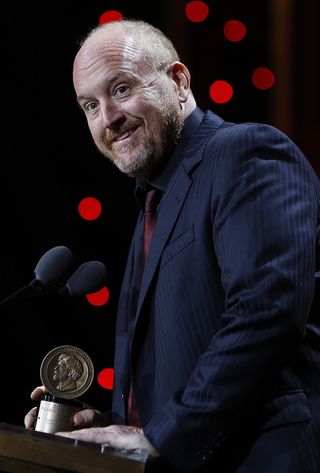Forgiveness
Louis C.K. Is Doing Comedy Again. Should We Tune In?
Restorative justice can help communities heal and move on from acts of harm.
Posted August 29, 2018
Louis C.K. did his first comedy set since he confessed to sexually harassing several women about nine months ago. I first learned this on Facebook when a friend, a previous fan of the comic and a supporter of the #MeToo movement, posed the question regarding whether or not it was OK to watch and enjoy his comedy again. This is clearly a question for all of us to consider, not only in regard to Louis C.K. but, more generally, what do we need, as individuals and as a society, to accept someone who has done harm back into our community, if not our good graces.

For the most part, we tend to want and expect an apology. And, indeed, apologies help, especially when they are sincere. But even then, many of us are left unsatisfied. Is that all there is? Am I now supposed to forgive?
On the one hand, that's clearly a personal choice and I would not presume to advise anyone on these kinds of personal decisions, especially as a man who does not have personal experience as a target of sexual harassment or sexual violence. On the other hand, it seems to me that there is value in a public discourse that focuses not on individual choices to forgive or not but on the more general question of how do we reintegrate people back into our communities when they've acted contrary to community values and caused considerable harm in the process. Restorative justice theory and practice was designed, in part, to engage these exact kinds of questions.
Generally speaking, individuals who are isolated or otherwise excluded or ostracized are more likely to cause harm, not less. As a result, when the safety needs of the community can be reasonably assured, reintegration back into community is one of the goals of restorative justice. Here's what such a restorative process might look like, in this particular case.
From a restorative justice perspective, the Louis C.K. case presents an excellent opportunity. Louis C.K. has already acknowledged what he did and at least some of the women he targeted have already come forward. A restorative process would invite the women who were harmed and anyone else who might have created conditions for what happened. Following preparation meetings to support all parties in sorting out what it is important for them to say and what it would be constructive for others to hear, a face-to-face dialogue would be arranged. With the help of an experienced facilitator, the first part would focus on mutual understanding in regard to the impact of Louis C.K.'s actions (including on himself). Additional restorative questions might be asked and some dialogue might emerge based on the questions and needs of those who are present, but understanding impact and, if necessary, why individuals made the choices they made is typically primary.
Eventually, the group would discuss what should happen next and make agreements accordingly, again with the support of a facilitator. Some of these agreements should create future accountability for Louis. Others should address harm to the women involved and to the larger community, which was also harmed by this breech of trust and boundaries. It’s not up to me (or other RJ facilitators) to decide what else he should do but personally I’d like to see him go on the talk circuit to discuss how men are socialized into predatory behavior and how that’s problematic.
Because this is likely to be emotionally difficult for someone in Louis C.K.'s shoes, it would be appropriate for the group to consider what support he might need and how that support can be put into place. This focus on supporting the person who did the harm in making amends is important because, in a restorative process, the goal of future actions is not public shaming (or anything punitive) but rather, the repair of harm (to the degree possible), not only to the specific individuals but to the fabric of the community. In this case, public discourse designed to challenge and change dominant norms about male sexual behavior would hopefully create more safety for the entire community. Finally, because Louis C.K. is a public figure and this has already been part of the public discourse, it would be important to release to the public the agreements made in the restorative process, not only so that the community is informed regarding these new developments but also to increase the accountability for everyone following through with the agreements.
I don't expect that what I outlined above (i.e., the talk circuit) will feel satisfying for everyone. I suppose it represents what I personally would want to see before I'm ready to watch Louis C.K. again. The beauty of restorative practices, however, is that the individuals who are directly involved get to make offers and requests and together determine what actions are needed. The women involved may have very different needs and requests and it is their needs and the needs of others who are present (including those of Louis C.K.) that would be prioritized, because we want everyone involved to come out whole. Consider this an opportunity to think through what you would want from such a process. What would you need in order to have closure and satisfaction? What would you need to feel whole again?


